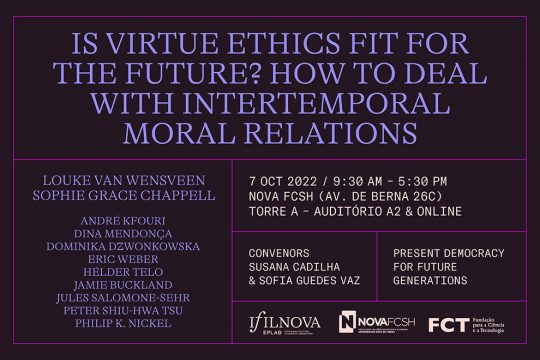
Is Virtue Ethics fit for the future? How to deal with intertemporal moral relations
A conferência “Is Virtue Ethics fit for the future? How to deal with intertemporal moral relations” terá lugar em formato híbrido na NOVA FCSH (Torre A – Auditório A2) e online, via Zoom, no dia 7 de outubro, entre as 9:30 e as 17:30.
Keynote Speakers:
Sophie Grace Chappell (The Open University)
Louke van Wensveen (Independent scholar)
A conferência, organizada por Susana Cadilha (IFILNOVA) e Sofia Guedes Vaz (IFILNOVA/Sociedade de Ética Ambiental), decorrerá no contexto das atividades do projeto de investigação Democracia Presente para Gerações Futuras (EPLab/IFILNOVA).
Para participar na sessão via Zoom, use este link.
IFILNOVA’s based project PRESENT DEMOCRACY FOR FUTURE GENERATIONS focuses on the possibility of reconfiguring certain key concepts originated especially in modernity (e.g., rights, representation, sovereignty, etc.) in order to to assess their viability in a world order that must expand the time horizons of individual and collective decision-making to solve some of its most pressing problems. Such concepts and institutions tend to emerge in debates about intergenerational justice or about the priority of the long term typically within a deontological or a utilitarian framework – inquiries into the existence of moral duties towards future generations, the welfare of future persons, and the equal consideration of the interests of future people provide good illustrations of such general preference for deontology and utilitarianism. This workshop aims at discussing an alternative framework, namely, the possible contributions of virtue ethics as a normative theory fit for the future.
The landscape of intergenerational questions includes a strong moral topography as it is obvious and clear that our present actions will affect life and health of future generations. This assessment is no longer doubtful or even problematic, but it opens a discussion on its multiple normative possibilities.
Since virtue ethics focuses on the agent and on character formation, it is the agent herself that is the subject of her own morality, which implies some sort of timelessness where the future might be included by default. In this workshop we aim to tackle a morality for the future from the perspective of virtue ethics.
PROGRAMA
07/10/2022
09:30
Boas-vindas e apresentação
09:40
Keynote Speaker | Sophie-Grace Chappell (The Open University, UK)
Virtue ethics and environmental crisis *online*
10:25
Invited Speaker | Dominika Dzwonkowska (Center for Ecology and Eco-philosophy, Poland)
Imagining the perfect future moral character
11:00
Pausa para café
11:15
Peter Shiu-Hwa Tsu (Department of Philosophy, Chung Cheng University)
What Is the Conception of Virtue That Is Most Suited to Cope with Future Challenges? *online*
11:45
Jamie Buckland (University of York)
Virtue Ethics is Too Individualistic to Deal with Climate Change: A Buddhist Critique and Resolution
12:15
André Kfouri (Universidade NOVA de Lisboa)
Anscombe’s ‘meanwhile’
12:45
Almoço
14:00
Jules Salomone-Sehr (Centre de Recherche en Éthique – McGill University)
Intergenerational Cooperativeness *online*
14:30
Hélder Telo (Universidade NOVA de Lisboa)
Aristotle and Seneca on Happiness and the Concern with Future Generations
15:00
Dina Mendonça (Universidade NOVA de Lisboa) & Eric Weber (University of Kentucky)
At the Heart of Dewey’s Ethics – virtues and the crucial place of particular and unique relationships
15:30
Pausa para café
16:00
Philip K. Nickel (Eindhoven University of Technology)
Virtuous Risk
16:30
Keynote Speaker | Louke van Wensveen (Independent scholar)
Fitting Dirty Virtues to Daunting Futures
17:15
Observações finais
Universidade NOVA de Lisboa – Faculdade de Ciências Sociais e Humanas, Lisboa
